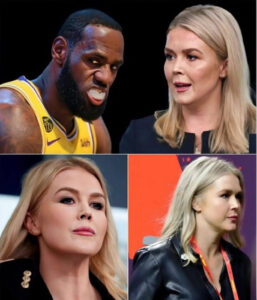When LeBron James referred to Karoline Leavitt as “𝙆𝙆𝙆 𝘽𝘼𝙍𝘽𝙄𝙀,” it was anticipated that she would not emerge unscathed. The insult was incendiary, intentional, and impeccably timed to explode across every social media feed, every late-night comedy routine, and every anonymous comment section filled with keyboard warriors harboring grudges. Two words—𝙆𝙆𝙆 and Barbie—placed side by side to elicit the utmost hostility. One associated with violence and fear. The other linked to plasticity and derision. Combined? It was deeply personal, racial, cultural, and misogynistic—all encapsulated in a single blow.
Her name became a topic of discussion for all the wrong reasons. Clips began to circulate. Commentators engaged in speculation. Opponents displayed smirks. Supporters remained silent. And Karoline? She refrained from making any statements. No tweets. No responses. No press conferences or exclusive interviews. This silence endured just long enough for people to start questioning whether she was delaying or planning a strategy.
They didn’t have to question for long.
When she finally responded, her reply was neither loud nor filled with anger. It didn’t even mention his name. It was merely a single post—seventeen words, stark and emotionless in black text against a white background:
